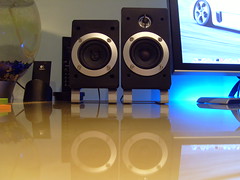AP English Poetry terms Flashcards
Terms : Hide Images [1]
| 8640837202 | alliteration | Repetition of initial consonant sounds |  | 0 |
| 8640837203 | allusion | A reference to another work of literature, person, or event |  | 1 |
| 8640837204 | antithesis | A balancing of two opposite or contrasting words, phrases, or clauses. |  | 2 |
| 8640837205 | apostrophe | A figure of speech that directly addresses an absent or imaginary person or a personified abstraction, such as liberty or love. |  | 3 |
| 8640837206 | assonance | Repetition of vowel sounds |  | 4 |
| 8640837208 | blank verse | Unrhymed iambic pentameter |  | 5 |
| 8640837209 | cacaphony | Harsh, awkward, or dissonant sounds used deliberately in poetry or prose; the opposite o |  | 6 |
| 8640837210 | caesura | A natural pause or break in a line of poetry, usually near the middle of the line. | 7 | |
| 8640837211 | conceit | A fanciful, particularly clever extended metaphor | 8 | |
| 8640837212 | consonance | Repetition of consonant sounds |  | 9 |
| 8640837213 | couplet | A pair of lines that end in rhyme |  | 10 |
| 8640837214 | devices of sound | The techniques of deploying the sound of words, especially in poetry. |  | 11 |
| 8640837215 | diction | Choice of words |  | 12 |
| 8640837217 | dramatic poem | A narrative poem in which one or more characters speak | 13 | |
| 8640837218 | elegy | a sorrowful poem or speech | 14 | |
| 8640837220 | enjambment | A run-on line of poetry in which logical and grammatical sense carries over from one line into the next. |  | 15 |
| 8640837221 | extended metaphor | A metaphor that continues beyond it's initial use, can be developed at great length |  | 16 |
| 8640837222 | euphony | pleasant, harmonious sound |  | 17 |
| 8640837223 | eye rhyme | rhyme that appears correct from spelling but does not rhyme because of pronunciation |  | 18 |
| 8640837225 | figurative language | words or groups of words that exaggerate or alter the usual meanings of the component words |  | 19 |
| 8640837226 | free verse | Poetry that does not have a regular meter or rhyme scheme | 20 | |
| 8640837227 | heroic couplet | A pair of rhymed, iambic pentameter lines. | 21 | |
| 8640837228 | hyperbole | purposeful exaggeration for effect |  | 22 |
| 8640837229 | imagery | Language that appeals to the senses. |  | 23 |
| 8640837230 | irony | A contrast between expectation and reality |  | 24 |
| 8640837231 | internal rhyme | A word inside a line rhymes with another word on the same line | 25 | |
| 8640837232 | lyric poem | A short poem of songlike quality |  | 26 |
| 8640837234 | metaphor | figure of speech comparing two different things |  | 27 |
| 8640837235 | meter | A regular pattern of stressed and unstressed syllables in a line of poetry |  | 28 |
| 8640837236 | metonymy | A figure of speech in which something is referred to by using the name of something that is associated with it |  | 29 |
| 8640837238 | narrative poem | A poem that tells a story |  | 30 |
| 8640837239 | octave | 8 line stanza | 31 | |
| 8640837240 | onomatopoeia | A word that imitates the sound it represents. | 32 | |
| 8640837241 | oxymoron | A figure of speech consisting of two apparently contradictory terms |  | 33 |
| 8640837242 | paradox | a contradiction or dilemma |  | 34 |
| 8640837243 | parallelism | A literary technique that relies on the use of the same syntactical structures |  | 35 |
| 8640837244 | paraphrase | (v.) to restate in other words; (n.)a statement that presents a given idea in new language |  | 36 |
| 8640837245 | personification | A figure of speech in which an object or animal is given human feelings, thoughts, or attitudes |  | 37 |
| 8640837246 | poetic foot | a group of syllables in verse usually consisting of one accented syllable and one or two unaccented syllables associated with it. | 38 | |
| 8640837247 | pun | a play on words that are identical or similar in sound but have sharply diverse meanings |  | 39 |
| 8640837248 | quatrain | 4 line stanza | 40 | |
| 8640837249 | refrain | A line or set of lines repeated several times over the course of a poem. | 41 | |
| 8640837250 | rhyme | Repetition of sounds at the end of words | 42 | |
| 8640837252 | rhythmn | pattern of beats or stresses in spoken or written languages | 43 | |
| 8640837253 | sarcasm | harsh, cutting language or tone intended to ridicule |  | 44 |
| 8640837254 | satire | A literary work that criticizes human misconduct and ridicules vices, stupidities, and follies. |  | 45 |
| 8640837255 | scansion | Analysis of verse into metrical patterns | 46 | |
| 8640837256 | sestet | 6 line stanza | 47 | |
| 8640837257 | simile | A comparison using like or as |  | 48 |
| 8640837258 | sonnet | 14 line poem |  | 49 |
| 8640837259 | stanza | A group of lines in a poem | 50 | |
| 8640837260 | strategy | management of language for a specific purpose | 51 | |
| 8640837261 | structure | arrangement of material within a work | 52 | |
| 8640837262 | style | mode of expression in language | 53 | |
| 8640837263 | symbol | A thing that represents or stands for something else, especially a material object representing something abstract. |  | 54 |
| 8640837264 | synecdoche | . a figure of speech that utilizes a part as representative of the whole. "All hands on deck" is an example. | 55 | |
| 8640837265 | syntax | Order words occur |  | 56 |
| 8640837266 | tercet | 3 line stanza | 57 | |
| 8640837268 | theme | Central idea of a work of literature | 58 | |
| 8640837269 | tone | Attitudes and presuppositions of the author that are revealed by their linguistic choices (diction, syntax, rhetorical devices) | 59 | |
| 8640837270 | understatement | a statement that is restrained in ironic contrast to what might have been said |  | 60 |
| 8640848774 | chiasmus | a figure of speech by which the order of the terms in the first of two parallel clauses is reversed in the second. This may involve a repetition of the same words: "Pleasure's a sin, and sometimes sin's a pleasure"—Byron | 61 |
